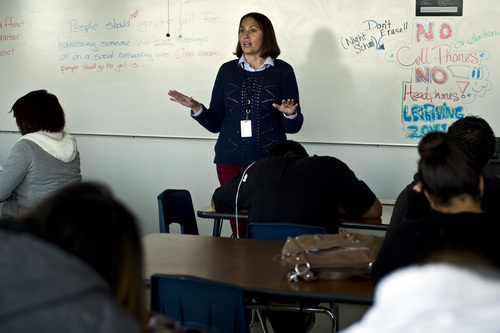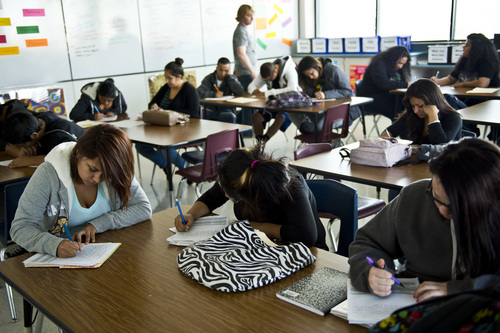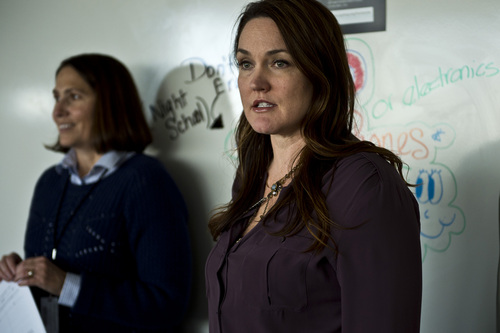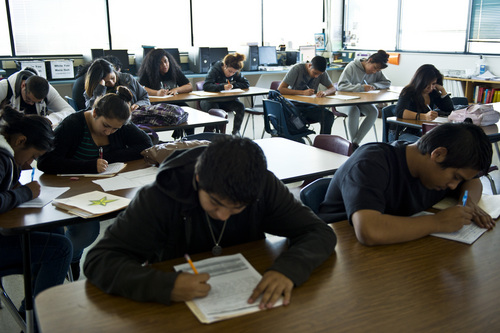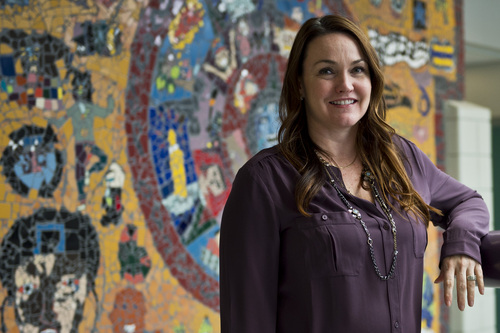This is an archived article that was published on sltrib.com in 2013, and information in the article may be outdated. It is provided only for personal research purposes and may not be reprinted.
The Utah Legislature likely will alter its new School Grades accountability system, and one thing is almost certain to change: the way alternative high schools are graded.
Students who are failing in traditional schools turn to alternative schools to help them catch up on credits to graduate. If that's not possible, the schools help students earn a general education diploma (GED), or an adult education diploma, or move on to a trade school or even to college.
Senate President Wayne Niederhauser said there's a growing consensus among lawmakers that the Legislature should change the way it grades alternative schools.
"Their objectives are different, so we need to narrow in on those," said Niederhauser, R-Sandy. Still, he added, "There needs to be some accountability there."
Alternative schools are on the agenda for a task force of lawmakers and education officials that meets regularly to discuss changes in School Grades, he said. No specific changes have yet been proposed, however.
Half of Utah's 18 alternative high schools received F's when the first round of grades came out in September. Two more had D's and two had C's. Five of the schools didn't receive grades because too few of their students took the tests used to measure progress.
The system grades schools based on three criteria: growth from one year to the next in academic performance, graduation rates and student achievement on end-of-year tests.
By those measures, alternative schools — sometimes lucky to have a student for even 90 days out of the year — will always look bad, say principals angered by School Grades.
The 18 schools showed 4,125 students enrolled last year, but hundreds more spent short amounts of time in the schools. Such students have trouble succeeding in traditional schools for all kinds of reasons, such as family turmoil, poverty, language difficulty, social phobias, substance abuse and pregnancy.
"I care because of the image for our students," said Joe Kelly, principal at Landmark High in Spanish Fork. "Our students have been dropped out, kicked out and failed, most of them from seventh grade up. So how does that feel? Now you're going to a failed high school, too."
Kathleen Chronister, principal of Mountain High in Kaysville, wrote a sharp letter to lawmakers after her school got an F, and she, Kelly and two other principals appeared before the Legislature's Education Task Force last month.
If one point of School Grades is to help parents choose among schools, it's silly to include alternative schools, Chronister said later. "It's not like parents are out saying, 'Which alternative school should I send my child to?' "
Mindi Holmdahl, principal of Horizonte Instruction and Training Center in Salt Lake City, told lawmakers the grades are unfair to students.
"We want them to show us something besides failure," she said. And yet the School Grades system is formulated in such a way that the failing grades are inevitable for most alternative schools.
"It seems a little bit disingenuous," she said.
The alternative-school principals had more say in the parallel school accountability system, Utah Comprehensive Accountability System (UCAS), which came out a month after School Grades.
The Utah Office of Education worked with principals to come up with a formula that measures not just academic growth at alternative schools, but also attendance and credit-earning improvement as well as students' graduation or movement toward something productive such as trade school. School climate also accounts for some points.
Holmdahl calls UCAS a "good beginning point" because it reflects those things the schools are trying to improve, such as attendance, the number of students earning credits, and preventing students from dropping out.
Chronister agrees, but notes that even under UCAS, much of the final score depends on only a few students. The schools don't have two years' worth of test results to measure progress for most students.
"My [Mountain High] score was based on one-sixteenth of our kids," she said.
Niederhauser said it's "still up for discussion" whether School Grades will adopt UCAS-like permutations to grade alternative high schools.
"The task force and Legislature are open to ideas on how we would deal with that," he said.
Twitter: @KristenMoulton —
Assessing your school
Those interested in learning about a school's School Grade or score under the Utah Comprehensive Accountability System (UCAS) can go to the data gateway on the Utah Office of Education's website, https://psdreports.schools.utah.gov/Gateway/.


